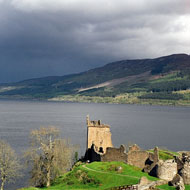
DNA study will look at what lives in the UK’s largest freshwater body
Scientists are planning to use DNA sampling techniques to find out if there is any basis for the legend of the Loch Ness Monster.
Professor Neil Gemmell from the University of Otago told BBC News he is not expecting to find a monster, but believes there could be “a biological explanation for some of the stories”.
The research team will spend two weeks in June collecting samples, which will be sent to laboratories in New Zealand, Australia, Denmark and France.
Prof Gemmel is quoted as saying: “There’s absolutely no doubt that we will find new stuff. And that’s very exciting.
“Whilst the prospect of looking for evidence of the Loch Ness monster is the hook to this project, there is an extraordinary amount of new knowledge that we will gain from the work about organisms that inhabit the Loch Ness - the UK’s largest freshwater body.”
The team are planning to identify plants, fish and other organisms by comparing their DNA sequences with those held on a large, international database.
Reports of a ‘monster’ near the Loch Ness date back to the sixth century AD, when Irish monk Saint Columba is said to have seen a ‘water beast’ in the River Ness. Further ‘sightings’ of a pre-historic or dragon-like animal were later reported to Scottish newspapers in the 1930s.
Since then, a number of people have claimed to capture photographs, video footage or sonar images of the creature, but the scientific community regards it as a phenomenon without biological basis - believing sightings are down to hoaxes or misidentification of other objects.
Image by: Sam Fentress/Wikipedia/CC BY-SA 2.0



 RCVS Knowledge has welcomed Professor Peter Cockcroft as editor-in-chief for Veterinary Evidence.
RCVS Knowledge has welcomed Professor Peter Cockcroft as editor-in-chief for Veterinary Evidence.